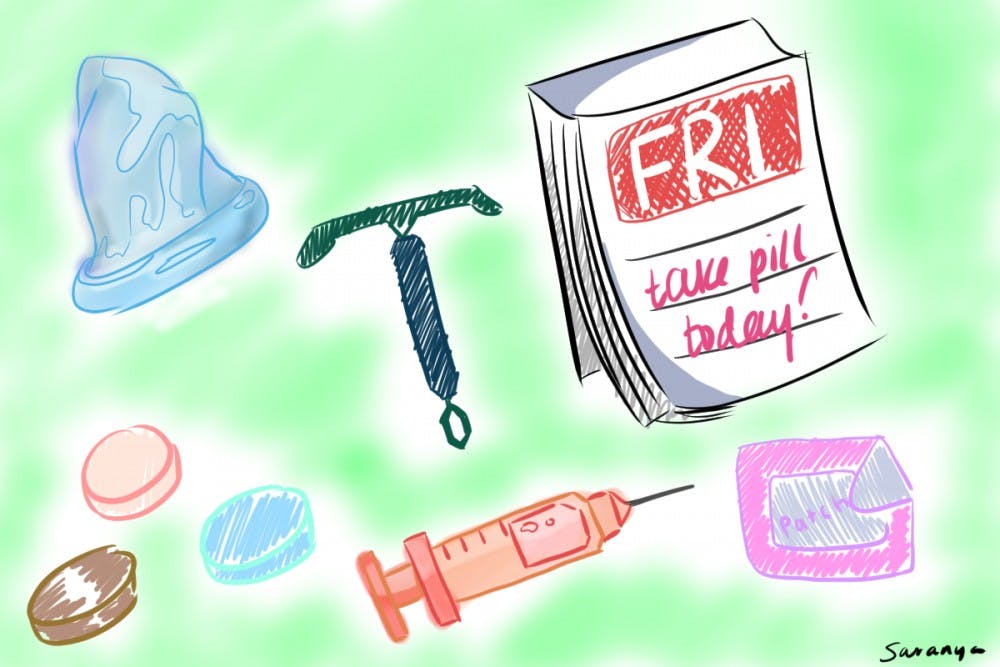A nightly 8 p.m. alarm, a text from your mom, a reminder on your phone, or your roommate taking her pill. No matter what tracking method you use, remembering to take your birth control and refill your prescription can be a pain.
But now there’s an app for that. Nurx has been called “Uber for birth control.” It allows you to obtain a prescription through your mobile device and it delivers contraception to your door, starting at $15 dollars per pack of pills without insurance, as well as NuvaRings ($30–$75 dollars), patches ($30–$44 dollars per month), and emergency contraception ($40–$50 dollars). It requires answering a few health questions, requesting the service you need, syncing your insurance, and obtaining a doctor’s approval—essentially your typical doctor’s visit condensed into a digital version.
Now available in 21 states, Nurx is being downloaded throughout the nation. And it might prove to be an effective solution to the lack of doctors available to women in certain areas.
Still, whether we like it or not, the discussion surrounding birth control remains controversial: access to it, its effectiveness, the hormones involved—the list goes on and on. Regardless, 62 percent of reproductive–age women in the United States use contraception. Some of them are members of the Penn community.
“I’ve found that it has given me a lot of piece of mind…. it makes me a lot more comfortable in my own body. However, I’ve found that other people I know who are on birth control have had very different experiences with it than I have,” said Zoe Walker (C ’21).
Taking birth control is a personal choice. For some women, it helps them feel more in control of their bodies and provides them with a sense of security. Others have reasons unrelated to pregnancy prevention.
“I take it personally for acne purposes just because throughout high school it really helped dial that down. But I feel like everyone should have access to it for whatever reason they need,” said Sarina Divan (C ’21). “And I know that reason is different for a lot of people and so I’m very pro–birth control for anyone who chooses that for themselves,” she continued.
Access to birth control is a national point of contention. Since the election of President Trump, many women have felt anxious about their reproductive rights going forward, particularly within today’s hook up culture. This is especially pertinent for low–income women who live in areas without suitable doctors, and don’t have easy methods to go about obtaining birth control.
Mila Bria–Massaro (C ’21) spent her summer working at the Parkland Center for Clinical Innovation in Dallas, Texas. One of the projects she worked on was increasing the availability of birth control to marginalized groups of women. She noted that although downloading a mobile app seems easy, it can actually be quite difficult for low–income women who have busy schedules and are skeptical of using it.
Walker elaborated further on this. “A lot of the grunt work in getting this to work is getting women who would need this service, who are often marginalized and/or low income, to download this app,” she explained.
While Nurx has its shortcomings, many people remain open to the idea of using the app in order to obtain their prescriptions in a more efficient manner.
“I think it would be a lot more convenient, because I remember last semester I kept forgetting that I needed to refill my birth control, but if I called to refill it, it would always be the Sunday that the pack ended and then I would have to skip the first day which is like the worst day to skip,” said Divan.
However, some find visiting their primary care physician or gynecologist reassuring, and would be reluctant to digitize how they obtain their contraception.
“I have an amazing primary care doctor who I feel very very comfortable talking to. I went to her last summer and she put me on birth control and the process was super easy,” Walker said. “So I think that I personally wouldn’t use that service just because I like routing [my birth control] through my doctor who knows me very well.”
While Nurx could be an incredible way to provide birth control to those who have limited access to trustworthy medical care, not that many people know about it yet.
So many things are available through apps now: food, dog walking, laundry services, even random chores. With the introduction of Nurx, prescription birth control is now a part of the already–prominent culture of digitized lifestyles.







